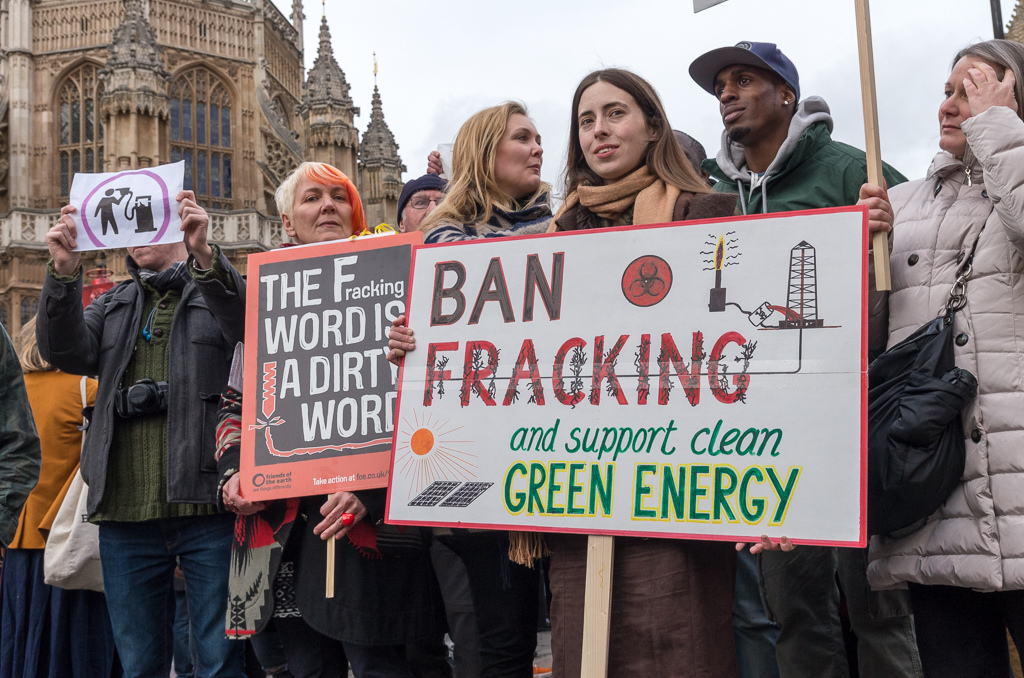As anti-fracking groups prepare to take legal action over recent shale gas decisions, the government has announced changes which could make future challenges more expensive, writes Ruth Hayhurst at Drill or Drop.
Lawyers and campaigners have warned that new rules revealed by the Ministry of Justice on 17 November could deter people who oppose decisions which they believe will have a significant impact on the environment.
A case against the approval of fracking by North Yorkshire County Council, which goes to the High Court in London on Tuesday, 22 November, will not be affected. Nor will challenges, announced last week, to decisions made by the Local Government Secretary on fracking in Lancashire.
But the law firm, Leigh Day, which represents two groups seeking a judicial review in the North Yorkshire case, has said the change will “create a climate of fear and uncertainty”.
The new rules have been opposed by the joint Green Party leader, Caroline Lucas, and by Friends of the Earth, one of the parties seeking a judicial review this week.
Current Cap on Costs
The UK is required under European law to make sure that the costs of bringing certain environmental challenges is not “prohibitively expensive”.
The current rules ensure that people who apply for a judicial review on an environmental decision know how much they will have to pay if they lose. Since 2013, the costs have been capped at £5,000 for an individual or £10,000 for a group.
But under the new rules, this cap on costs could be varied. Applicants for a judicial review will have to provide financial information to the court. If they lose, the opposing side can apply to increase the cap if they think the applicant can afford to pay more.
The government said the proposals were designed, in part, to prevent claimants abusing the process of judicial review to delay or stop projects.
But Leigh Day said environmental cases make up less than one percent of the total number of judicial reviews lodged each year in 2013 and 2014. And compared with all cases, environmental judicial reviews have higher success rates.
The Ministry of Justice (MOJ) said it did not believe the changes would prevent or discourage individuals or organisations from bringing meritorious challenges.
But only a handful of participants in a consultation on the proposals agreed with this conclusion. Of the 234 responses on this proposal, only four supported it.
‘Chilling Effect on Challenges’
According to the MOJ, some participants said the new rules would be “onerous, complex and have a chilling effect on challenges”. Others argued that the current cap on costs was not the total amount a claimant had to pay. They also had to find court fees and their own legal costs, which were often £25,000 or more.
Jamie Beagent, a partner in Leigh Day, said: “These proposals will create a climate of fear and uncertainty amongst those wishing to challenge projects imposed upon them and their environment.
“It will certainly make it harder for individuals to challenge projects of high public concern, including the new runway at Heathrow, the UK’s performance on air pollution, HS2 or the proposals for fracking across the UK.”
He added: “These proposals could be in place as soon as next month, making any challenge of this new enforced regime, through judicial review, difficult and potentially prohibitively expensive.”
The Green Party MP, Caroline Lucas, told The Guardian: “We know that high and uncertain costs have a chilling effect on the ability of ordinary citizens and civil society to hold the government to account on these issues. In this context, these proposals represent a huge threat to environmental justice and we will fight them every step of the way.”
The MOJ said the rules would be changed by the Civil Procedure Rule Committee of the House of Commons. The impact would be reviewed two years after the rules come into force.
An MOJ spokesperson said: “We want a justice system that works for everyone. The cost of bringing environmental challenges must not be prohibitively expensive, especially to those with limited means. Our proposals will also deter unmeritorious claims, which are expensive and delay vital infrastructure projects.”
The MOJ said the changes would be made as soon as parliamentary time allowed and would not apply retrospectively to cases already underway. The challenges undertaken against fracking decisions in North Yorkshire and Lancashire would not be affected, a spokesperson added.
This article has been cross-posted from Drill or Drop.
Photo: Ron F via Flickr | CC 2.0
Subscribe to our newsletter
Stay up to date with DeSmog news and alerts







